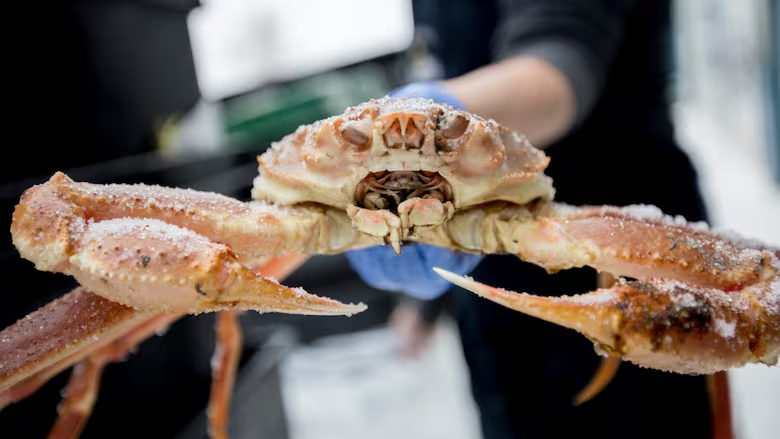Snow crab fishery's 'sustainable' certification suspended for 2nd year
Marine Stewardship Council not convinced a single season with no whale deaths means fishery is sustainable

Despite a year when no North Atlantic right whales died in the Gulf of St. Lawrence, the snow crab fishery has not won back its certification from a marine stewardship group.
The Marine Stewardship Council has extended the suspension of its "sustainable" fishing certification for New Brunswick crab products by another year.
The council suspended its certification last March after 12 right whales were found dead in the Gulf of St. Lawrence in 2017.
At least two deaths were linked to entanglements in snow-crab fishing gear.
Last season, the federal government instituted widespread fishing closures and shipping-speed limitations. Although there were no deaths, three whales were still entangled in snow crab gear.

A report by the North Atlantic Right Whale Consortium last fall said just 411 North Atlantic right whales remained.
But on top of the improved safety for whales last year, scientists have spotted multiple right whale calves in U.S. waters, viewed by many as a good sign for the endangered species' survival.
SAI Global, the organization that had to recommend whether to lift the suspension, said all parties have made "impressive" efforts toward conservation.
But SAI decided the suspension should continue because one season without deaths doesn't necessarily mean whale entanglements have been eliminated.
For the industry to be re-certified, it must show scientific evidence that fishing activities will not hurt whale recovery efforts.
Gilles Thériault, the president of the New Brunswick Crab Processors, said the industry is "extremely disappointed and frustrated with [the] decision."
In a media release, he called for the certification to be reinstated and said the industry has collaborated with the government and used innovative technologies, "resulting in no mortalities in 2018."
Snow crab caught in the southern gulf is worth about $129 million a year, of which New Brunswick's share is about $75 million.
Little impact in 1st year
In an interview, Thériault said the suspended certification didn't have much impact on sales last year.
"The suspension occurred just on the eve of the season, so the marketplace didn't react and our product sold very well," he aid,
However, this year sellers may hesitate before selling Acadian snow crab without certification, Thériault said.
"That is a worry to us," he said. "We will continue our efforts. …Right now, we're not in a position to say there's zero risk in all of this, and the only way we could have zero risk right now is to shut down the whole snow crab industry."
He said the industry is moving in the right direction but will need more time to reduce the risk.
The 2019 season will start in April or May, depending on the weather. Federal restrictions have been eased slightly for this year.